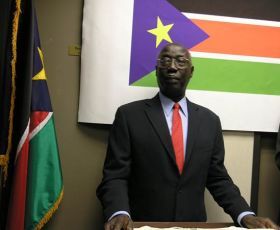Abyei’s Francis Deng says he did not vote for unity
By Ngor Arol Garang
January 19, 2011 (ABYEI) – Sudanese academic and politician, Francis Mading Deng, a native of the oil-producing region of Abyei has denied media reports that he voted for unity in during the recently concluded plebiscite to decide whether the south will separate from the north.

Chief Deng was one many in the area claimed to have accepted transfer of Abyei to Kordofan in central Sudan in 1905 from the Bahr el Ghazal region of south Sudan following an administrative survey of distance to determine from where Abyei would be administered by former British district administrative officer.
Abyei was due to hold a referendum decide whether it would rejoin the south last week but it has not materialized due to disagreements over voter eligibility between Sudan’s ruling parties.
Educated both in Sudan and United States of America, Deng has become a prominent public figure, serving as state minister of foreign affairs in the government of former Sudanese President, Jaffar Mohammed Nimery. He has also authored several books on Sudan and is currently a special advisor to Secretary General of the United Nations on conflict prevention and genocide affairs.
He has been a strong advocate for united Sudan based on equality and peaceful coexistence advocated by the late John Garang the leader of southern rebels the SPLM from 1983 until his death in 2005, months after he signed Sudan’s landmark Comprehensive Peace Agreement with Khartoum.
His position on the unity of Sudan allowed him to form cordial relationship with successive Khartoum based governments.
However, some of the people, especially from Abyei view his relations with Khartoum differently with many accusing him of working against the interests of the area.
South Sudan’s independence plebiscite, agreed as part of the peace deal, was completed successfully on January 15, with an overwhelming vote for secession expected.
During referendum Khartoum-based Radio Omdurman and Arabic daily newspaper; Ahkbar el Yom reported that Deng said he would vote for the unity of Sudan as opposed to secession, arguing South Sudan was not ready to govern itself.
However, in statement seen by Sudan Tribune on Wednesday, Deng denied the comment. He also said he did not vote for either option because he had information that citizens of Abyei in the Diaspora were not allowed to register for south Sudan referendum.
“I have learned that it has been rumored and even broadcast on television that I voted for unity. That did not happen. In fact, I was informed that the citizens of Abyei in the Diaspora were not allowed to register, far less vote, in the Southern Referendum. I therefore did not vote. But had I voted, there can be no doubt that I would have voted for the secession of the South,” explained Deng.
Deng said his support for independence of south Sudan could be substantiated by his writings and public statements both at home and abroad.
“That I support independence is evident in my writings and in my public statements, both at home and abroad. It is difficult to see how a Southerner could vote for unity under the present system in which Southerners would continue to be treated as second-class citizens. Of course; I have been a strong supporter of the vision of the SPLM for a new Sudan of full equality for all citizens”.
“However, the Comprehensive Peace Agreement was a compromise based on the recognition that the vision of the New Sudan could not be achieved through armed liberation struggle alone. Since unity could not be made attractive for the people of the South under the current system, Southern independence was the predictable and just outcome of the self-determination referendum,” he explained.
The top diplomat, however, accepted that he used to support SPLM vision of new Sudan full of equality for all citizens. “I have no doubt that the vision of New Sudan – of full equality of all racial, ethnic and cultural groups – has so inspired many throughout the country that it will continue to be pursued in the North through the democratic process. Should that be achieved, perhaps that will create a basis for reconsidering the relationship between the North and the South,” he explained.
He said wrote a self explanatory book which he said was published recently about the future of Sudan regarding secession and unity option.
“After all, as I wrote in my recently published book, Sudan at the Brink: Self-Determination and National Unity, “unity and separation are varying degrees of relationships that could be strengthened or weakened by the qualitative factors involved.”
“For now, however, the exercise of self-determination has given the people of the South the freedom to pursue equality, integrity and dignity. For this achievement the people of the South should be exceedingly happy and proud, and should indeed be congratulated,” he commented.
(ST)
